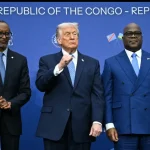President Ruto’s decision to waive ID replacement fees is a political and administrative masterstroke that will send ripples across the Kenyan landscape long before the next ballot is cast. While the surface-level goal—boosting voter registration—is clear, the underlying implications are far more complex and revealing of the evolving nature of Kenyan politics.
1. Targeting the “Missing Millions”:
The primary impact will be on the demographic often referred to as the “missing millions”—predominantly young, first-time voters, and individuals in rural and low-income urban areas who have been disenfranchised by the cost and complexity of bureaucracy. By eliminating the fee, the government is directly targeting this vast, untapped electoral bloc. Their political allegiances are often less fixed, making them a crucial swing demographic that could decide the outcome of a tightly contested election.
2. A Test for IEBC Infrastructure:
This policy will immediately test the capacity of the IEBC and the Registrar of Persons. A successful waiver could trigger an avalanche of applications. The question is: Is the government machinery ready to handle this surge efficiently? Long queues, delays, and system failures could frustrate the very citizens the policy aims to help, turning a popular decision into a public administration nightmare. The government’s ability to scale up services will be critical.
3. The Political Narrative:
This move allows the administration to craft a powerful narrative of being a “government of the people,” one that prioritizes inclusivity over revenue collection. It puts political opponents in a difficult position; opposing it would be seen as anti-people, while supporting it cedes the initiative to the incumbent. The waiver is as much about public perception and winning hearts and minds as it is about raw voter numbers.
4. The Long-Term View:
Beyond the next election, this could signal a permanent shift in how Kenya views civic duty. If successful, it could pave the way for other reforms aimed at dismantling barriers to participation, such as integrating digital ID systems with voter registration to create a seamless process. It raises a fundamental question: Should the proof of citizenship, which is a right, ever have a price tag?
In conclusion, the ID fee waiver is a multifaceted strategy. It is a social policy that empowers the poor, a political strategy that targets new voters, and an administrative test that will reveal the state’s efficiency. Its ultimate success won’t be measured by the announcement, but by the number of new, shiny voter’s cards in the hands of those who were previously left on the sidelines of democracy.










